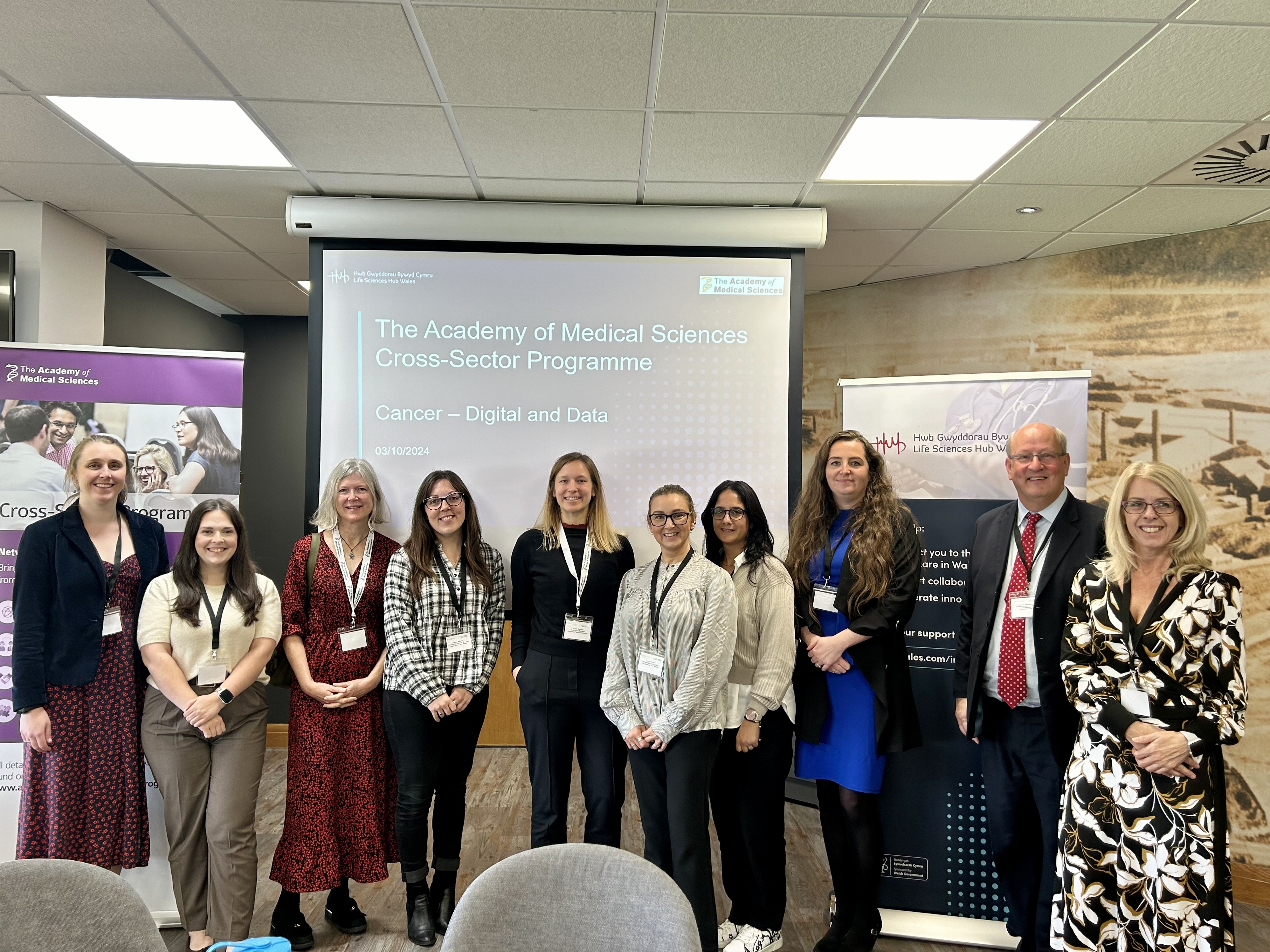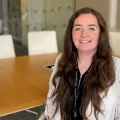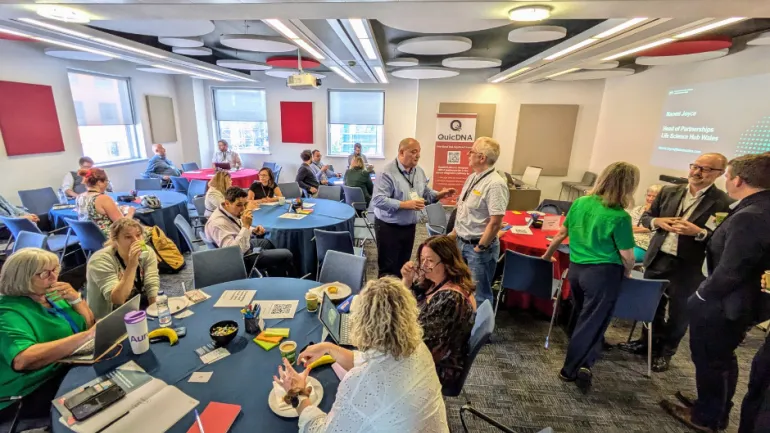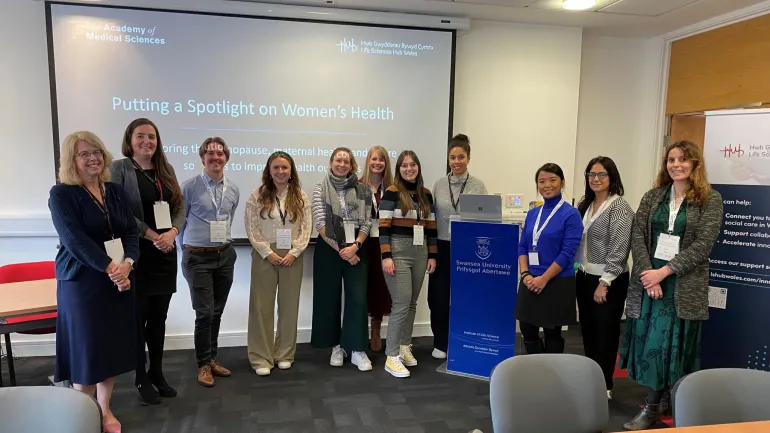In partnership with the Academy of Medical Sciences, we hosted a cross-sector event that brought together innovators, researchers, and professionals to foster collaboration and explore the transformative role of data and digital technologies in cancer care.

Chaired by Hamish Laing (Professor of Enhanced Innovation & Engagement, Business at Swansea University and Non-Executive Director, Life Science Hub Wales), the event sparked discussions around health innovation, data-sharing and the importance of patients in data conversations, and the importance of cross-sector partnerships in transforming cancer care.
The role of patient data in cancer care
The day started with a powerful talk from Michael Handford (Professor of Applied Linguistics and English Language), who shared his personal experiences as a former cancer patient, reminding the room of the importance of the patient voice in data. Drawing on his own experiences, Michael discussed how data is used in cancer care, and the ways it can feel impersonal. Michael contrasted his treatment in Tokyo, Japan, with that at Queen Elizabeth Hospital (QEH), in Birmingham, UK.
In 2011, after completing treatment in Tokyo, Michael discussed how he was offered the option to take 40 CDs worth of his medical data with him. This story highlighted the overwhelming amount of medical information patients often face, and are left to navigate – which raised a key question: How can patients meaningfully engage with their own health data when it feels inaccessible or incomprehensible?
Michael’s decision to decline the CDs stressed the challenge of making medical data not just available, but understandable. He reflected on receiving treatment in both Japan and the UK, highlighting the contrasts in patient care approaches between countries. Although access to care was quicker in Japan, despite being costly, post-treatment care at QEH was more patient-centred, and in Tokyo, Michael sometimes felt like a ‘case’ rather than individual.
These experiences highlighted the importance of personalised, patient-centred care, especially in curative cancer. While quantitative evidence supports the value of personalised care, patients often feel reduced to “dots on a graph” – a statistic rather than individuals with unique needs. Michael explained that the use of overly technical language can alienate patients, making it harder for them to engage with their care. Michael stressed the importance of finding ways to make medical data not only accessible but also understandable for patients, noting that technology’s potential must be adapted to meet diverse patient needs. He stressed the value of cross-sector events like this, urging attendees to consider how partnerships across different fields could help patients feel more involved in their care and lead to improved healthcare communication strategies.
Challenges and opportunities in data access
Pedro Ramos, CEO of Promptly Health, discussed how better data access enables better value in cancer therapies, focusing on real-world data analytics. He addressed the economic burden of cancer across Europe and the importance of understanding what patients truly value in their healthcare experiences. Pedro also explored the role of privacy-enhancing technologies in making data access scalable while safeguarding patient information.
The audience questioned data ownership and accessibility in Wales, which sparked further discussion around how Wales is positioned in terms of making health data available to patients. Pedro acknowledged that while progress is being made, there are still significant opportunities for collaboration to enhance data-sharing frameworks, and ensuring patients have better access to their own health data.
Digital technologies for personalised cancer care
In addition to keynote presentations, the event featured table discussions allowing delegates to dive deeper into specific topics, one in particular focused on how cross-sector collaborations can optimise digital technologies for cancer care.
Participants explored current challenges such as the integration of health systems within the NHS, and how tools like mobile apps could be better utilised to give patients easier access to their data. There was also a strong focus on the role of our everyday devices, such as wearables like smartwatches and rings, in providing real-time health information, that can give you daily information quicker than a GP appointment, and how these could be integrated for personal care. While the tools offer promising benefits, concerns were raised about the accuracy of data they collect, as well as challenges around data privacy and governance.
Key discussions also highlighted that effective cross-sector collaboration – spanning healthcare, technology, academia, and industry, is key to unlocking the potential of digital technologies and data in enhancing cancer care.
Key takeaways and future directions
Ronan Lyons (Professor of Public Health at Swansea University) delivered an insightful session on Wales’ unique position in leading population-wide data approaches to cancer prevention and treatment. Ronan discussed how existing platforms like SAIL and SeRP, could be enhanced through deeper collaborations and advanced technologies such as AI, and natural language processing (NLP). Ronan stressed that we should view Wales as the best place for data-informed cancer research, provided there’s sufficient will and agility to leverage the existing infrastructure.
A key takeaway from the discussions and talks throughout the day, was the need to make health data more accessible and comprehensible, especially for patients with complex and overwhelming conditions like cancer. The use of AI and other technologies can potentially play a big role in this, but there must be a focus on tailoring solutions to the emotional needs of individual patients.
The event showcased the power of cross-sector collaboration in advancing cancer care, bringing together experts from healthcare, academia, industry, and research. Keynotes and discussions throughout the day made it clear that Wales has potential to lead the integration of digital technologies and data. By continuing to build bridges between sectors, Wales can create a more patient-centred, innovative cancer care ecosystem.
Attendees left the event with a sense of purpose, supported with new connections and collaborative ideas that could drive meaningful change in the future of cancer care.
Don’t miss out on future opportunities to shape the future of cancer care. To join our next event, contact us at hello@lshubwales.com





